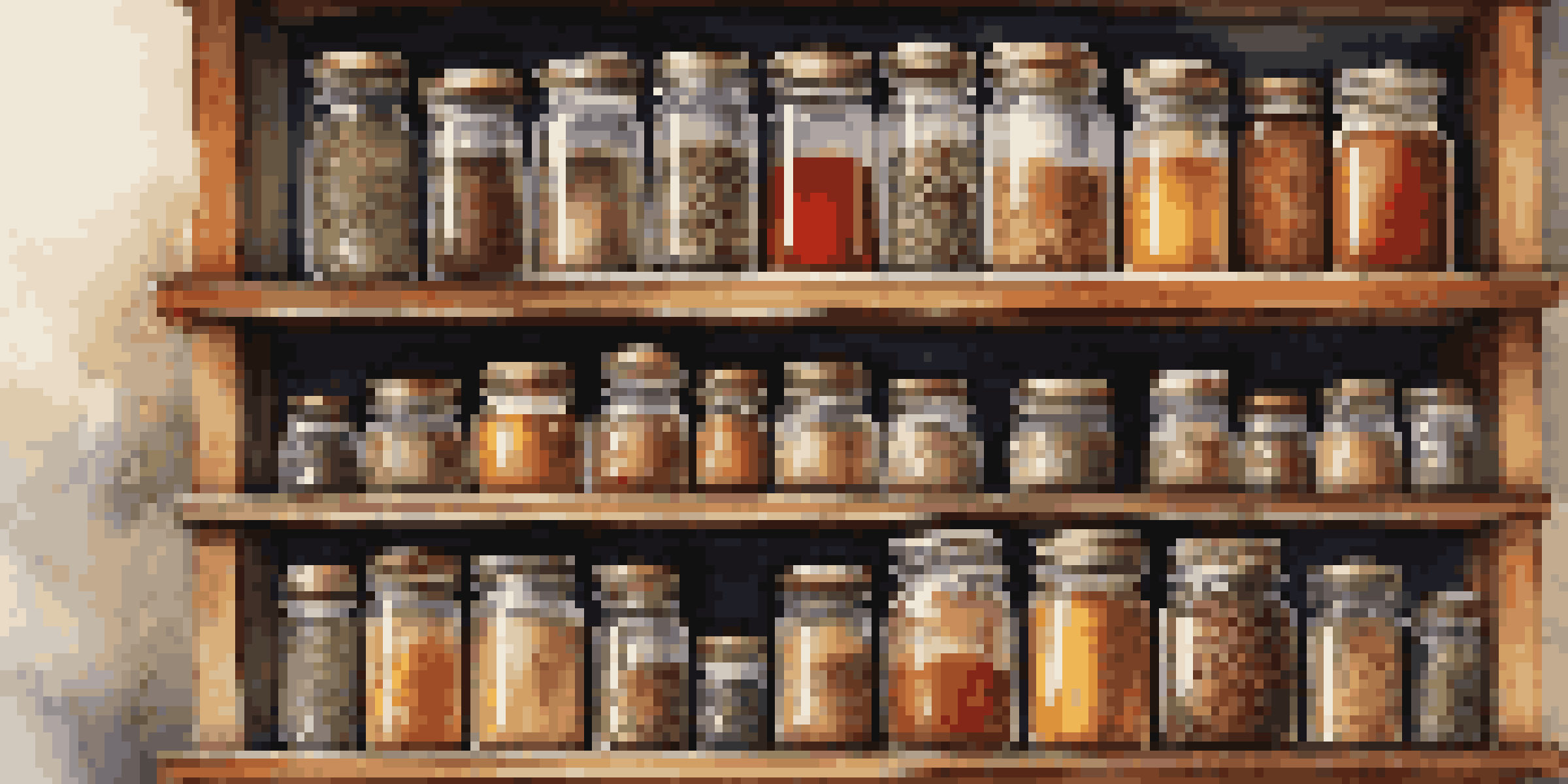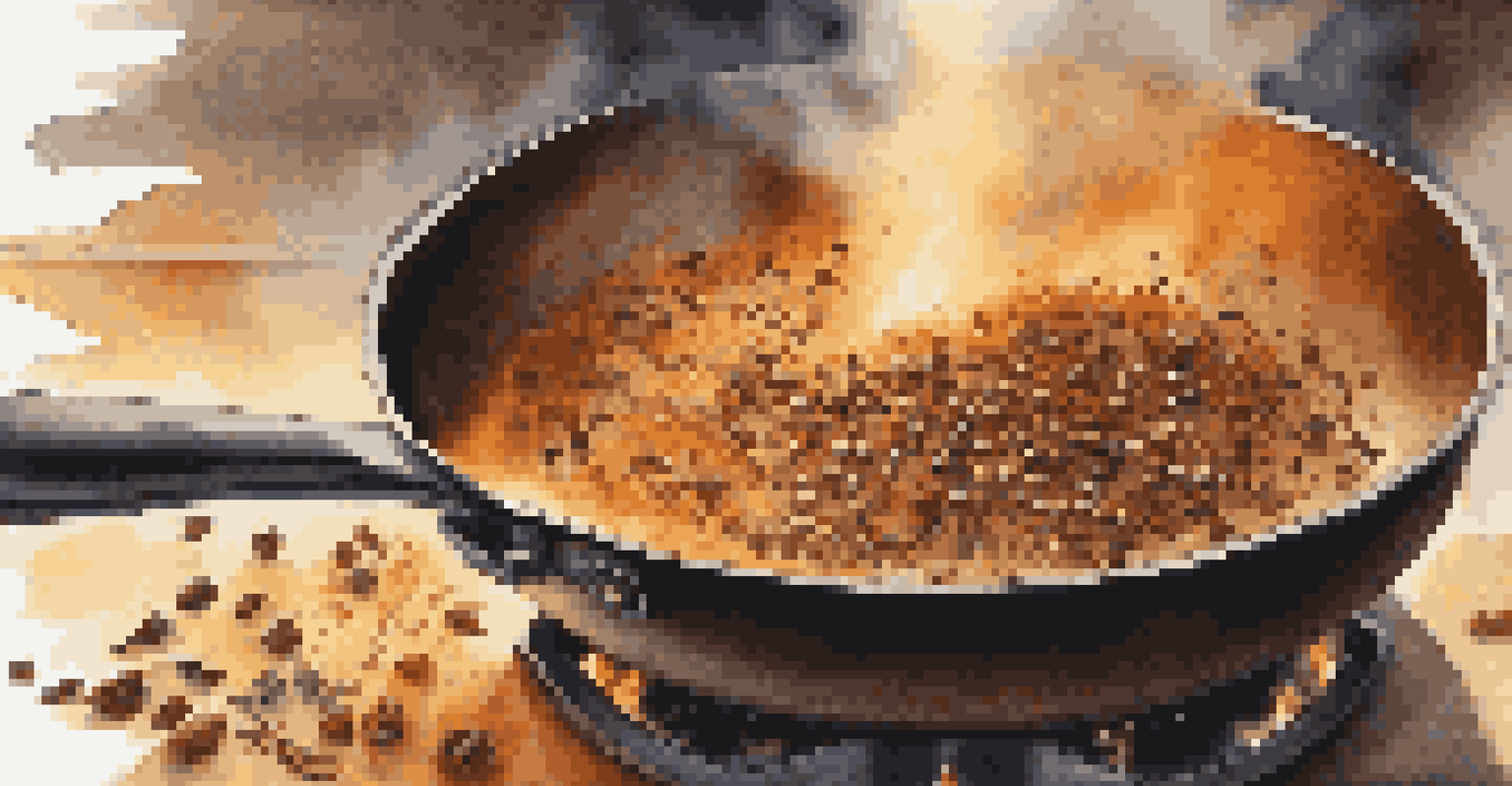The Benefits of Cooking with Whole Spices: Techniques to Try

Unlocking Flavor: Why Whole Spices Outshine Ground Ones
Whole spices pack a punch when it comes to flavor. Unlike their ground counterparts, they retain essential oils and volatile compounds that can quickly dissipate once ground. This means when you use whole spices, you’re getting a fresher, more vibrant taste in your dishes.
Spices are the most important ingredient in a kitchen. They are the soul of cooking.
Imagine biting into a fragrant curry or a warm chai tea; the explosion of flavor you experience comes from the whole spices slowly releasing their essence during cooking. This gradual release not only enhances flavor but also adds complexity to your dishes, making them more enjoyable.
Furthermore, using whole spices allows for greater control over the intensity of the spice. You can easily adjust the flavor by adding more or less, giving you the freedom to create a dish that suits your taste perfectly.
Health Benefits: Whole Spices and Nutritional Value
In addition to flavor, whole spices offer numerous health benefits. Many spices are rich in antioxidants, vitamins, and minerals, making them a valuable addition to a balanced diet. For instance, turmeric contains curcumin, known for its anti-inflammatory properties, while cinnamon can help regulate blood sugar levels.

When you incorporate whole spices into your cooking, you not only boost the flavor but also enhance your meals' nutritional profile. This means you can enjoy delicious dishes while reaping the positive effects on your health, creating a win-win situation.
Whole Spices Enhance Flavor
Whole spices retain essential oils, providing a fresher and more complex taste in dishes.
Moreover, the act of cooking with spices can make meals more satisfying, potentially leading to healthier eating habits overall. When your food is flavorful and appealing, you’re more likely to enjoy what you eat and feel fulfilled.
Techniques for Using Whole Spices: Toasting for Extra Depth
One effective technique for using whole spices is to toast them before adding them to your dishes. Toasting releases the natural oils in the spices, intensifying their aroma and flavor. Simply heat a dry skillet over medium heat and add your spices, stirring frequently until they become fragrant.
The only thing that will make a dish taste better is the right seasoning.
This simple step can elevate your cooking, transforming a regular dish into something special. For example, toasting cumin seeds before adding them to a curry can provide a warm, earthy note that enhances the overall flavor profile of the dish.
Remember to keep an eye on your spices while toasting, as they can go from perfectly fragrant to burnt in a matter of seconds. This attention to detail will ensure you get the most out of your whole spices.
Experimenting with Infusions: Whole Spices in Liquids
Infusing whole spices into liquids is another fantastic way to harness their flavors. You can add spices such as cardamom or cloves to water, broth, or even milk to create aromatic bases for soups, stews, or beverages. This technique allows the spices to gradually release their flavor, resulting in a rich and fragrant infusion.
For example, simmering whole spices in coconut milk can create a delightful base for a curry, while adding them to a pot of boiling water can transform your ordinary tea into a spiced delight. It’s like a flavor party in your pot!
Health Benefits of Whole Spices
Incorporating whole spices boosts nutritional value by adding antioxidants and vitamins to your meals.
Don’t hesitate to experiment with different combinations of spices to find your perfect infusion. The beauty of cooking with whole spices lies in the endless possibilities for flavor enhancement.
Balancing Flavors: Pairing Whole Spices with Other Ingredients
Pairing whole spices with other ingredients can create beautifully balanced flavors in your dishes. Understanding which spices complement each other is key to achieving harmonious taste. For instance, pairing warming spices like cinnamon with sweet ingredients such as apples can create a delightful contrast.
A classic example is the combination of cumin and coriander, which often works wonders in savory dishes. This balance not only enhances the dish’s flavor but also creates a more satisfying culinary experience.
As you explore different combinations, keep in mind that less is often more. Start with small amounts of spices and adjust according to your taste preferences, ensuring that no single flavor overpowers the others.
The Art of Grinding: Freshness at Your Fingertips
Investing in a good spice grinder can open up a world of flavor. Grinding whole spices just before use ensures that you’re getting the freshest and most potent flavors possible. The aroma that fills your kitchen as you grind spices is a sensory experience that adds excitement to your cooking.
You can choose between manual grinders, like a mortar and pestle, or electric grinders, depending on your preference. Both methods offer a unique way to connect with your ingredients, enhancing your overall cooking experience.
Proper Storage Maintains Freshness
Storing whole spices in a cool, dark place and using airtight containers helps preserve their flavor and potency.
Plus, grinding your spices allows you to create custom blends tailored to your taste. This personal touch can elevate your dishes and make them truly unique.
Storing Whole Spices: Tips for Maintaining Freshness
To fully enjoy the benefits of whole spices, proper storage is essential. Keep them in a cool, dark place away from direct sunlight, as light and heat can diminish their potency over time. Using airtight containers will also help preserve their freshness and flavor.
It’s helpful to label your spice containers with the purchase date, as whole spices typically have a longer shelf life than ground spices. While whole spices can last for years, their flavor can fade, so it’s best to use them within a reasonable timeframe.

Regularly checking your spice stash and replacing any that have lost their vibrancy will ensure you always have flavorful options at your fingertips.